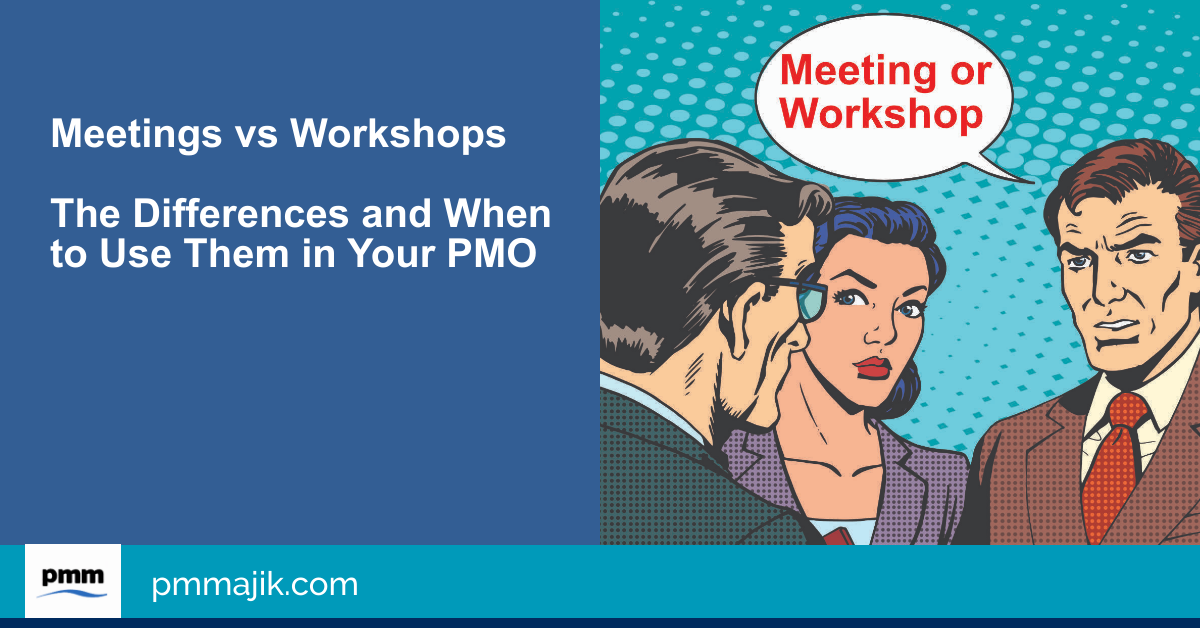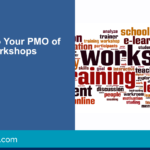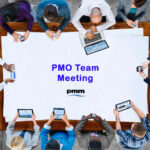Running workshops can have a range of benefits for your project management office (PMO). Workshops can be a powerful tool to get tasks completed, but there is still a place for regular meetings, so we’re going to look at the differences between meetings and workshops and when to use them in your PMO.
There are clear use cases for both meetings and workshops in your PMO. Meetings can feel like an interruption to the workday when done wrong, and workshops can feel like a talking shop if not directed properly.
If you plan your PMO workshop well, they will be productive. To help you understand when is the right time to run a workshop, we’re going to cover:
- The main characteristics of a workshop
- What you can expect from a meeting
- Use cases for both meetings and workshops for your PMO
What is a workshop?
A workshop is a type of meeting that has a clear task to complete by the participants. There will be a range of activities targeted towards getting an answer to a question and actions that need to be taken to resolve the issue at hand.
A workshop can last from a couple of hours to a number of days, depending on what needs to be accomplished. It should only be as long as absolutely necessary, but you need to allow for creative thinking and collaboration between people.
By the end of a workshop, you should have actionable outputs, whether that’s the list of priorities for the next project sprint or how to resolve a particular project problem. You should have a solid follow-up procedure to ensure everyone knows what’s next.
What is a meeting?
A meeting is a chance to exchange information. All workshops are a type of meeting, but of course, not all meetings are workshops.
In a meeting, you can expect one or multiple people to pass on information about the business, project or a task at hand. While they can sometimes be seen as merely talking shops, you can still come out of a meeting with actions that need to be done.
However, the point of the meeting isn’t to decide on those tasks – it’s purely a means to getting the information about those tasks across.
Your meetings can be quick 10-minute huddles to update everyone on the project status that day. They can also be long and involved, with many people taking the chance to give out information whilst a large group of colleagues gathered at once.
How do I choose between a meeting or a workshop?
You will need to choose a meeting when:
- You have information that needs to be exchanged rather than debated or filtered
- The project team needs time to talk about different subjects or topics
- Feedback needs to be gathered so it can be collected and analysed later – outcomes aren’t necessary
- The results of a workshop have been decided, and everyone needs to understand the next steps
On the other hand, the times you’ll want to choose a workshop can include:
- When a large task needs to be completed with a lot of input, such as setting project priorities or making a schedule, where the outcome isn’t fixed, and a range of knowledge is helpful
- When there is a roadblock in a project that would take a lot of time to work through using emails or messages, such as choosing the right tool for a task or making a choice for a site structure
- When you need a creative solution to an issue, and a diverse set of input and experience can present fresh options that your PMO hasn’t been able to think of
Workshops vs meetings
Both workshops and meetings have their place in your PMO. You’ll likely find that meetings happen much more often because the use case for a workshop is much more nuanced and targeted.
There are solid use cases for when you should use workshops and meetings in your PMO – remember that both should be well-structured and only as long as needed to get the job done.






